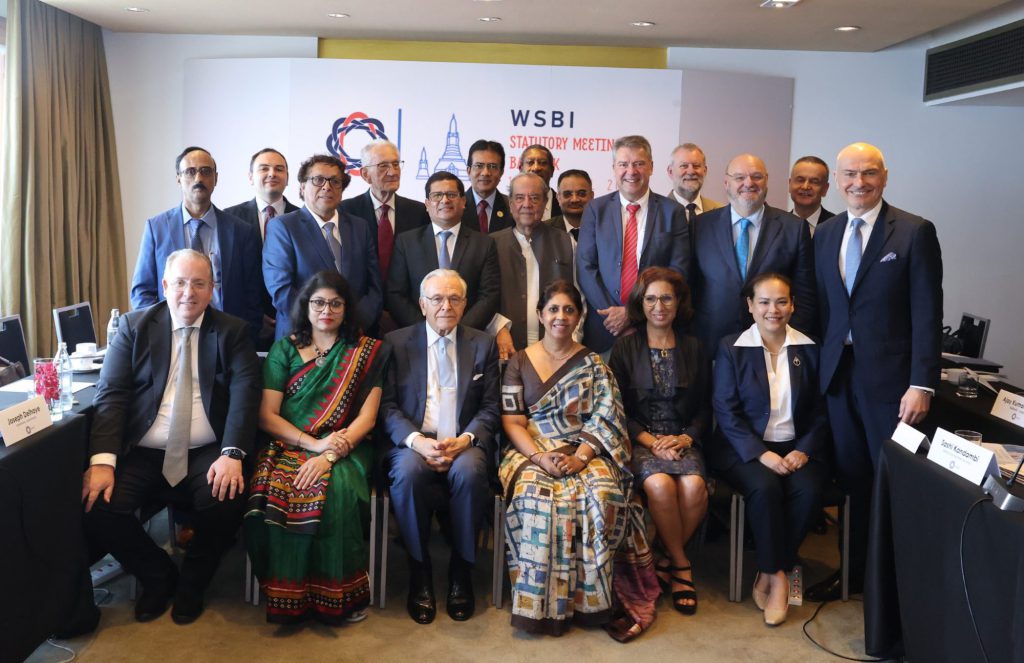The recently created Social and Philanthropic Council has issued the Bangkok Declaration, a manifesto that includes the commitment of the member entities to building a more inclusive and sustainable society across six areas of action: youth population, poverty reduction, support for education, women's empowerment, the elderly and sustainability of the planet
Isidro Fainé stated: 'The establishment of the Social and Philanthropic Council underlines our ongoing commitment to bring about positive change in the world around us. At the heart of our commitment lies a substantial investment in programmes geared towards fostering social change and addressing pressing social needs. Each year, WSBI allocates $2.8 billion towards social initiatives around the world. These are not just numbers, they represent tangible actions that reinforce communities, empower individuals, and drive meaningful progress around the world'.
Bangkok (Thailand), 19 April 2024.- The Chairman of Fundación "la Caixa" and CECA, Isidro Fainé, today chaired in Bangkok the first meeting of the Social and Philanthropic Council of the World Savings and Retail Banking Institute (WSBI), an organisation of which Fainé is also Chairman.
During his intervention, Isidro Fainé highlighted that 'the establishment of the Social and Philanthropic Council underlines our ongoing commitment to bring about positive change in the world around us. At the heart of our commitment lies a substantial investment in programmes geared towards fostering social change and addressing pressing social needs. Each year, WSBI allocates $2.8 billion towards social initiatives around the world. These are not just numbers, they represent tangible actions that reinforce communities, empower individuals, and drive meaningful progress around the world'.
The Chairman also added: 'Our collective efforts are generating profound changes in the lives of countless individuals and families around the world. Through our investments and initiatives, we do not only fulfil our corporate responsibilities but also embody the values of empathy and solidarity'.
The Social and Philanthropic Council was created last December in Marrakech, coinciding with the annual meetings of the International Monetary Fund. Its honorary chairman is Helmut Schleweis, Chairman of Sparkassen, the Association of German Savings Banks. This Council aims to enable the exchange of experiences and best practices among members with regard to their Obra Social programmes. At the same time, it advises and provides guidance on current global trends in philanthropy, identifying major social and economic areas that require important developments to improve sustainability and global stability.
Today's Council meeting addressed issues such as the contribution of WSBI member entities to the SDGs, and success stories of several member foundations were shared, among other topics. This first Council meeting also served to propose new collaboration projects between member entities, such as job creation and micro-enterprises in developing countries.
Similarly, the Chairman, Isidro Fainé, presented three of the flagship social programmes of Fundación “la Caixa”: CaixaProinfancia, the Senior Citizens programme Fundación Profuturo. The recent agreement signed between Fundación “la Caixa” and the Sparkassenstiftung (foundation of the association of German savings banks) on Silver Finance, supported by the Inter-American Development Bank, was also presented.
The Social and Philanthropic Council includes relevant international actors in Obra Social and philanthropy, such as the State Bank of India, the German Sparkassenstiftung, Colombia's Fundación Grupo Social, the Al Barid Bank of Morocco, Thailand's GSB Savings Bank Foundation, as well as Fundación “la Caixa” and CECA (Spanish Confederation of Saving Banks, its savings banks and foundations), along with other benchmark organisations.
Bangkok Declaration
During today's meeting, the members of the Council issued the Bangkok Declaration, a manifesto for change towards building more inclusive and sustainable societies, which sets forth the commitment of the member entities in six areas of action: youth population, poverty reduction, support for education, women's empowerment, the elderly and sustainability of the planet.
Accordingly, the entities undertake the commitment to direct their efforts towards social inclusion, poverty reduction, education, gender equality, youth and the elderly, and the preservation of our natural environment.
- Supporting young people: promote their inclusion in society and their transition to adulthood, entrepreneurship and the labour market, by encouraging financial education projects and increasing philanthropic activities in education and child poverty.
- Poverty reduction: scale up poverty reduction efforts by intensifying and recognising the critical need to support the most vulnerable from an early age. The entities' commitment extends to broader strategies designed to alleviate poverty across all age groups through sustainable development initiatives planned to meet immediate needs and promote long-term economic growth and self-sufficiency.
- Financial education: expanding educational support, enhancing support for education programmes, improving children's access to quality education and advocating for financial and digital literacy initiatives. The entities undertake the commitment to support a wide range of scholarships, research programmes and grants, which offer a variety of learning and development opportunities.
- Women's empowerment: promoting their economic and social empowerment, encouraging the growth of women-led enterprises and ensuring their full and effective participation in leadership at all levels of decision-making.
- Improving the care provided to the elderly: promoting programmes that provide comprehensive care for the elderly, covering physical and mental health services. In addition, the goal is to reinforce support for palliative care, ensuring comfort and dignity during the final stages of life.
- Protection of the planet: focusing more on biodiversity protection, the circular economy, green mobility solutions, as well as helping to reduce climate risk for vulnerable populations and contributing to climate change mitigation.
This commitment illustrates how retail and savings banks can play a crucial role in building a more sustainable and inclusive future by advocating for a banking paradigm shift aligned with the United Nations Sustainable Development Goals (SDGs).









